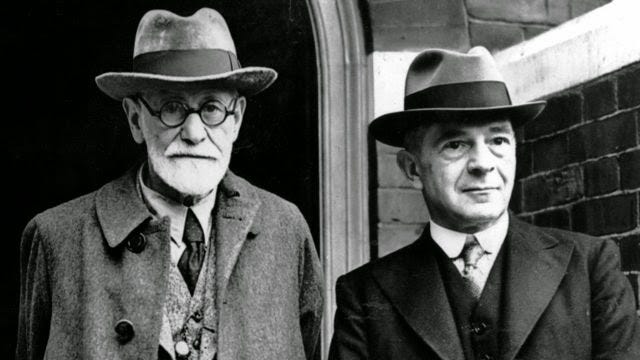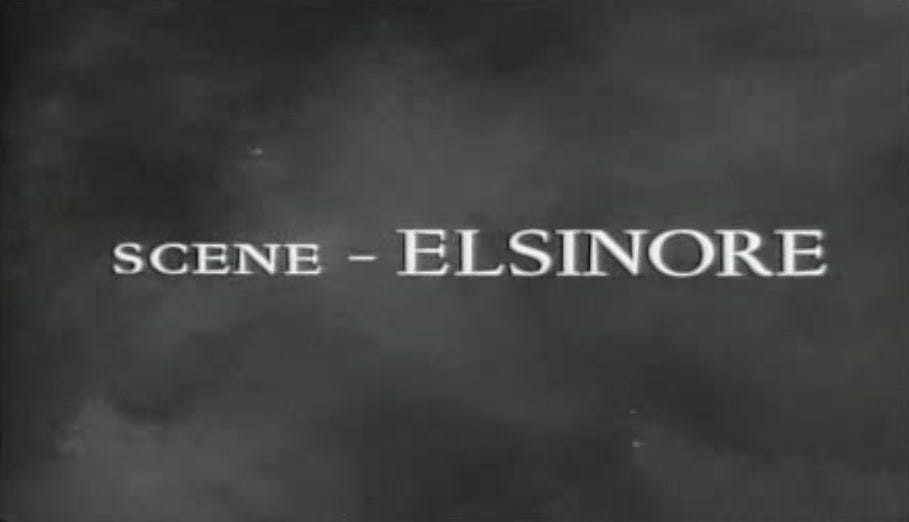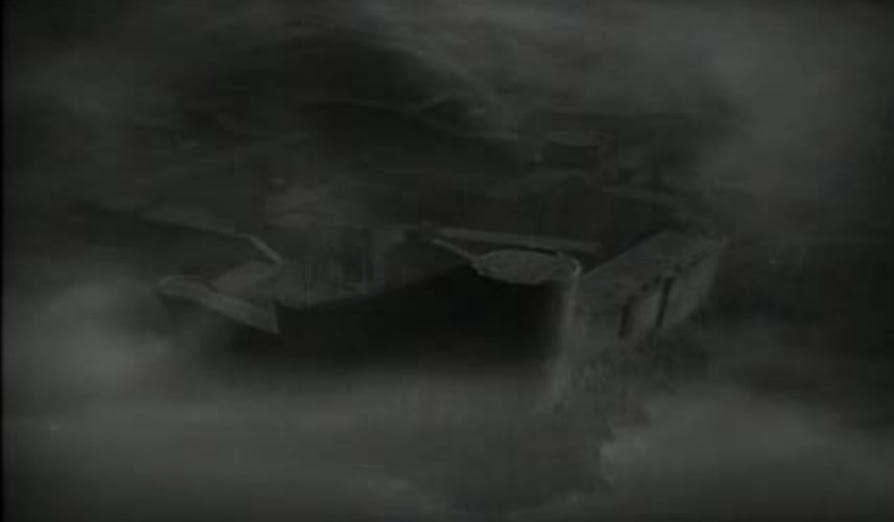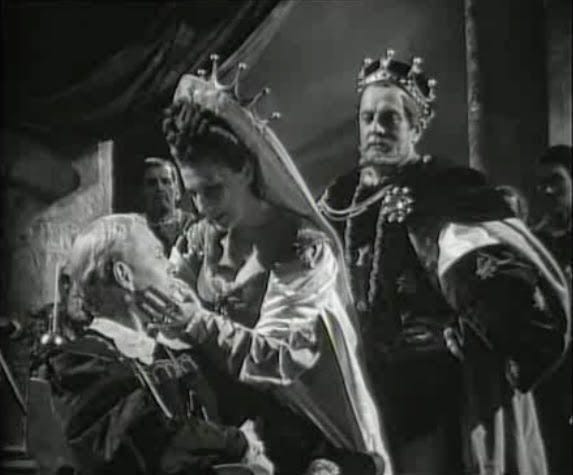In the opening of his 1948 Hamlet, Laurence Olivier identifies indecisiveness as the prince's tragic flaw, the "particular fault" that brings about his downfall. As the film unfolds, Olivier provides a Freudian explanation for that indecisiveness. I don't buy this interpretation of the play, but the film remains one of my favorites. Its unforgettable performances and creative camera work make it one of the best Shakespeare movies. It’s my desert-island Hamlet film. I've come to enjoy its Freudianism the way I enjoy the clothing or cars in a film noir, as an entertaining artifact of mid-twentieth-century culture.
Introducing Hamlet's "Particular Fault"
The opening credits roll over a castle that perches atop a surreally high promontory rising from a roiling sea. After the credits finish, the screen goes black, and then we see swirling fog and a title: "SCENE — ELSINORE."
The fog parts to reveal the castle and tower again, only now they're below us, as if we're looking down from the clouds.
The perspective is reminiscent of the opening of Olivier's 1944 Henry V, which shows us Elizabethan London from above. Olivier's fondness for aerial perspectives may have come from his experiences as a pilot in the Royal Naval Reserve. In On Acting, he writes that seeing England from the air made him think of John of Gaunt's patriotic "sceptered isle" speech from Richard II. A minor detail of this story, the plane Olivier was flying, is challenged in Terry Coleman's biography, but there's no reason to doubt the gist. Flying over his country made Olivier think of Shakespeare and feel patriotic.
In Henry V, he uses the aerial perspective patriotically, to show his wartime audience a high point of English civilization at a moment when it was being threatened. In Hamlet, he uses the perspective to introduce his vision of the play he considered Shakespeare's best.
He shows us the castle tower for a moment before letting the fog close over it. Then comes another title: a version of Hamlet's "mole of nature" speech from act one, scene four. In that scene, Horatio and the soldier Marcellus have brought Hamlet to the castle parapet to see the Ghost. Before the Ghost appears, they hear kettledrums, trumpets, and cannon fire. When Hamlet explains to Horatio that these accompany the King's drinking, Horatio asks, "Is it a custom?" which raises questions about his character. Is he Danish? Why doesn't he know about the custom when he knows so much else about the Danish court, like the history of its trouble with Norway and what the old king looked like?
To avoid raising such minor questions in a play full of more important ones, directors sometimes give Horatio's line to a different character. In his 1990 film with Mel Gibson, for example, Franco Zeffirelli gives the line to Marcellus (Christien Anholt), who as a common soldier might not know about royal boozing customs.
Olivier doesn't fret about such quibbles. When the line comes up in the story he gives it to his Horatio, Norman Wooland wearing a ridiculously large codpiece in his first major role.
Hamlet famously responds to Horatio's question by saying that the drums and trumpets are a custom but one "More honored in the breach than the observance." He goes on to make an analogy between the Danish national fault of excessive drinking and individual faults. In Olivier's opening title and voiceover—and again when the speech comes up in the story—the second half of the analogy goes like this:
So oft it chances in particular men,
That for some vicious mole of nature in them,
By the o'ergrowth of some complexion,
Oft breaking down the pales and forts of reason,
Or by some habit grown too much; that these men—
Carrying, I say, the stamp of one defect,
Their virtues else—be they as pure as grace,
Shall in the general censure take corruption
From that particular fault.
Olivier cuts lines about an individual not being responsible for his parentage and about personal defects being caused by nature or bad luck. He also cuts lines about bad habits overtaking pleasing ones. He replaces the lines with his own words—which I've italicized in the passage above—changing "some habit that too much o'er-leavens / The form of plausive manners" into "some habit grown too much." These alterations allow him to convey the passage's meaning quickly. They also somewhat change its character. In the original, as he is wont to do, Hamlet is philosophizing, speaking generally about human faults. He's not necessarily thinking of himself, though we are free to suspect that he is. By removing some of his general speculations, Olivier makes the passage point more directly at Hamlet's own "particular fault."
That the passage is specifically about Hamlet becomes clear when the title dissolves into another downward shot of the tower, which now holds Horatio and four soldiers carrying Hamlet's body. The sight of the corpse tells us that the passage we've been reading and hearing refers to the fault that led to Hamlet's undoing.
And what is that fault? Olivier doesn't make us puzzle this out. He finishes his voiceover of the "mole of nature" passage, pauses, and then tells us, "This is the tragedy of a man who could not make up his mind."
The line comes from Henry Hathaway's 1937 historical drama Souls at Sea. In On Acting, Olivier describes how in the film "Gary Cooper asks an intellectual and sensitive belowdecks crewman (Alan Ladd, I think) what book he's reading. 'Hamlet,' the sailor answers. 'A story about a guy who couldn't make up his mind.'"
Olivier misremembers the film. In a departure from his usual men-of-action-not-words roles, Cooper, not Ladd, played the intellectual crewman. Olivier's mistake is understandable. He wrote On Acting by reminiscing into a tape recorder almost a half-century after seeing the film and nearly four decades after making Hamlet. In a 1996 interview with Trevor Nunn, he attributed the line to the right actor and defended his use of it against critics who said it was "an outrageously simple explanation" of the play. Olivier admired the line's succinctness and felt was a good way of summing up Hamlet for a general audience.
Hamlet as an Indecisive Procrastinator with Mommy Issues
The idea that Hamlet is about its protagonist's indecisiveness began appearing in literary criticism after the 1795-96 publication of Goethe's Wilhelm Meister's Apprenticeship. Before Goethe, most people seem to have regarded Hamlet as a decisive and vigorous character who runs after a ghost, stabs an old man, sends boyhood friends to their deaths, jumps on a pirate ship, and wrestles in a grave. After Goethe described the prince as psychologically too weak for the task he'd been given, the idea that he was an indecisive intellectual took root in criticism and popular culture. By the time Grover Jones and Dale Van Every wrote the screenplay for Souls at Sea, they could count on people in their audience recognizing this portrayal.
Seeing Hamlet as a dithering egghead crudely reduces one of literature's greatest characters. While most readers would agree that it's silly to respond to the first ("O, that this too too solid flesh ") and fourth ("To be or not to be") soliloquies by saying, "Kill yourself or don't—make up your mind," many of these readers will argue that Hamlet is a procrastinator, unable to commit himself to avenging his father. But surely deciding to kill someone else should be as difficult as deciding to kill yourself, and to see Hamlet as a procrastinator means missing the complexity of moments like the one in act three, scene three, when Hamlet decides not to kill a praying Claudius. In that scene, Hamlet has progressed from being a monster who could "drink hot blood" to becoming genuinely demonic. No longer content to simply murder Claudius, he now wants to send his soul to hell. We miss the horror of this moment if we see it as procrastination.
People who argue that Hamlet is a dawdling intellectual point to two soliloquies: the third ("rogue and peasant slave") and seventh ("How all occasions").
In the third soliloquy, like a student with a late paper, Hamlet chastises himself for not acting (2.2.547-57). But the problem he raises near the soliloquy's end is perfectly legitimate. He can't know that Claudius killed his father—the Ghost may well be what Horatio suggested it was, a devil sent to damn Hamlet's soul. Before murdering the King, he should test the truth of the Ghost's tale.
In the seventh soliloquy, Hamlet again chastises himself for not acting on his vow of revenge, saying that his failure to act is all the more disgraceful because he has the "cause and will and strength and means / To do't." As I described in my soliloquies post, he may have the "cause and will and strength," but he doesn't have the "means"—he's being led out of the country under guard. The seventh soliloquy shows us a Hamlet so gripped by his desire for revenge that he can't see the reality of his situation. This Hamlet is far more interesting than the one who can't act because of unresolved Oedipal problems.
The Freudian Hamlet first appeared in a 1910 essay by Freud's British disciple Ernest Jones. In "The Oedipus-Complex as An Explanation of Hamlet's Mystery," Jones argued that Hamlet has trouble killing Claudius because Claudius has done what he would like to do—killed Hamlet's father and slept with his mother.

Jones's interpretation was firmly entrenched in the theater world when Olivier was preparing to play the role for the first time, in 1937 at the Old Vic. It would probably have influenced his performance even if he hadn't spoken to Jones himself. During long conversations, Jones not only reinforced the interpretation, he advised Olivier on how to use it on stage. In On Acting, Olivier says that Jones advised him not to make Hamlet's Oedipal problems obvious: "You're not supposed to tell the audience with every wink and nod that one of the reasons for your present predicament is that you wish you were still hanging on your mother's tits" (
Olivier followed this advice, letting Hamlet's supposed Oedipal problems inform his performance but not making the problems explicit. A decade later, in his film version, he made them more obvious by casting the American actress Eileen Herlie as Gertrude. Herlie was eleven years younger than Olivier—she was born in 1918, Olivier in 1907—and on screen, they make a plausible romantic couple, while Herlie and Basil Sydney, who plays Claudius, look a bit like a trophy wife and her drunken creep of a husband. From the first moment we see Herlie's Gertrude and Sydney's Claudius together, holding hands in the second scene, we can understand why Hamlet would find them repulsive.
By the end of the scene, we can understand why he would have Oedipal issues. Herlie's Gertrude puts her hands on his shoulders, caresses him under the chin, and kisses him on the mouth.
These intimate gestures become more sexual in act three, scene four, where, after Hamlet throws her on the bed and attacks her for marrying Claudius, she kisses him on the lips again and lays her head in his lap.
Herlie and Olivier's performance is unforgettable, and I suspect that Franco Zeffirelli had it in mind when he directed Glenn Close and Mel Gibson in the same scene. As is true of Herlie and Olivier, the age difference between Close and Gibson—she's only nine years older—makes them seem more like lovers than mother and son. Throughout the film, Close kisses Gibson on the lips. When they reach act three, scene four, the kisses' sexual nature becomes obvious. Gibson throws Close on a bed and simulates intercourse as she gasps. After she kisses him on the mouth, he calms down and puts his head in her lap. Other than being more explicit—what was permissible on screen had changed considerably in fifty-two years—Zeffirelli's rendering of the scene closely resembles Olivier's. His representation of the Gertrude-Hamlet relationship is identical.
But what had seemed bold in 1948 was already dated by 1990. For over half a century, critics had been pointing out that the play provides no solid evidence for Jones's interpretation. Hamlet hates his father and wants to sleep with his mother? Really? He twice describes his father as god-like, and being repulsed by his mother's overhasty marriage doesn't mean that he wants to have sex with her. Freudians answered these objections by saying that Hamlet's praise of his father is a way of overcompensating for his hatred and that he can't consciously acknowledge his desire for his mother.
There was no arguing with critics who used the absence of evidence as evidence. Jones's interpretation remained popular until the 1970s and '80s when more critics, psychologists, and others began describing the interpretation's underpinning—the Oedipus complex—as nonsense.










